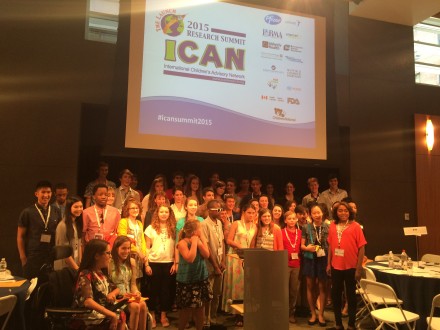Blog post
Involving children in clinical research? iCAN.
From the inauguration of Abraham Lincoln to the Watergate Scandal, Washington, D.C. has seen its fair share of historical events over the years.
Last week, another was added to its annals. For the first time, international groups of children and young people who advise researchers about how best to communicate with other children, and anticipate their needs during the course of clinical research, came together to talk to, learn from, and get to know one another at the launch of the International Children’s Advisory Network (‘iCAN’).

Participants at the iCAN summit[/caption]After a ‘getting to know you’ social event where games were played, and barbecue food enjoyed, the information and expertise shared between each group began in earnest on the first day of the Network’s launch. Each young persons’ group – including those from England, Scotland, Canada, Spain, France, Australia (established just three weeks ago), and the United States (including Georgia, Connecticut, and Ohio) – presented their work to their peers, parents, policy-makers, and group coordinators in the format of short films (all of which were devised and directed by young people). This exercise displayed the breadth of work undertaken by the groups, some of whom advise on and advocate for treatment, innovations, and policies that improve the health and well-being of children and young people, in addition to advising researchers on their protocols and the format and language of the information they offer to young participants. Next year’s event promises a chance to meet with other new groups, such as those from Germany and Italy which are well on the way to being established. The launch of this Network is clearly just the beginning of a promising knowledge-sharing enterprise.
The launch event itself – organised by a committee of young people, with a pinch of adult assistance – was, in my mind, stellar for one very particular reason: everyone, regardless of their reason for attending the launch, talked to one another. I’ve attended all too many events that have taken an ‘us and them’ approach to engaging with children (something we purposefully wanted to avoid at the launch event of our Children and clinical research report!). There was none of that at the iCAN launch: everyone had a say.
A workshop I ran on the third day of the conference also focused on what participants had to say. In this case, the opportunity for participants to voice their opinions was through an exercise designed around the Nuffield Council’s Youth Research Ethics Committee (YREC) project.
At the Washington launch, 130 participants were divided into groups of ten (a mixture of young people and adults), and were tasked with adopting the role of a REC. Each committee was given the same information sheet, which was based on a fictional research proposal that suggested a new way of treating children with severe asthma. They were then asked to think about whether the protocol raised any ethical issues within their groups before feeding back to the rest of the groups with three or four key points that their group had discussed.
One stipulation in the fictional protocol that was distrusted by all of the groups was the idea of giving participants a $20 voucher in recognition of their contribution to the research study. Some felt that any sort of monetary ‘reward’ should be dismissed; others thought that timing was key, and that if the voucher was a “nice surprise” at the end of the trial, then that was fine, but that participants should not be told about it in advance as they were concerned that it could incentivise potential participants. One typical comment was that “there’s an awful lot of bribery in this proposal.” Other groups noted that some potential research participants might feel pressured to agree to take part because of their prior relationship with, and reliance on, the lead research professor for their medical treatment.
Other participants were more concerned by what the protocol omitted to say. “Vagaries are not acceptable,” remarked one young person, who felt that participants were not given enough information. Concerns – especially pertaining to patient confidentiality and privacy – were expressed about the proposal to keep a sample of participants’ DNA “to answer future research questions”. This, suggested one group, simply wasn’t good enough. Nor, suggested another, was the lack of detail about the possible effect of ‘washing out’ their existing treatment for a period of two weeks, and the possible dangers of doing so. Had this been a genuine research proposal, with a ‘real’ researcher attached to it, I’m pretty sure that he or she would’ve been overcome by a crying jag based on participants’ ethical feedback.
Each group was then asked to give one sentence that it – in its role of an ethics committee – would say to the (fictional) researchers who proposed the protocol. The sentences / indictments levelled at the researchers were rather varied, ranging from “we would take part if the modifications to the ethics were carried out”, to an ultra-cautionary plea to “try it on adults and not do it on children”, to a call to arms to “increase your compensation, please perform your study well, and finally, help us help the world.”
Following their feedback, the groups were then shown a film where a REC comprised wholly of adults discusses the same protocol. This film showed the groups how many of their own concerns were mirrored by the adult REC. The observation of one young person after the workshop has really stuck with me since: “They’re really not so different from us.”
Comments (0)
Join the conversation